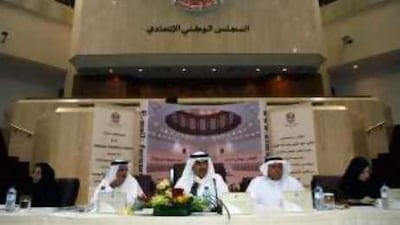ABU DHABI // The Federal National Council (FNC) said yesterday it was in the process of overhauling the way it operated. The shake-up would mainly target the way the Government handles legislation proposed by the FNC's 40 members. It would also revamp the drafting of parliamentary recommendations and gathering of information needed by members. "We are in the process of developing the work of the council. Our plan is to execute things calmly," said the speaker Abdul Aziz al Ghurair. "[This includes] the way the parliament works and even our interaction with ministers." Mr Ghurair, said the FNC has handed the Government a set of proposals to enable the legislative body to "provide better service". Although some of the proposals had been agreed, Mr Ghurair declined to give any details and said they would be announced as a full package later. He said some of the proposals entailed constitutional amendments, which are thought to include extending the parliamentary term from two to four years. However, Mr Ghurair added that "constitutional amendments are under the jurisdiction of the president and the Supreme Council", and that only the president had the right to decide on issues such as extending the parliamentary term. "We have our own opinion on this issue," Mr Ghurair said. "There are international practices on parliamentary terms spanning from two to six years. "We accepted to work under this constitution and we're happy to hand over the mission to other citizens." Several lawmakers have expressed frustration over the slow pace at which the Government has implemented recommendations. They have also asked for more powers to be able to hold ministers and other high-ranking officials accountable should they fail to perform their duties. Mr Ghurair said last month the parliament was engaged in lengthy talks with the Government to establish a procedure to ensure adoption of FNC suggestions. Once a parliamentary recommendation is passed, it is submitted to the Cabinet, which transfers it, if approved, to the concerned ministries. These recommendations are not binding and they are normally formulated by specialised committee. They are reached after discussing public issues ranging from health and education to labour and economy. "We always try to make practical recommendations. We can produce endless recommendations, but we are trying to be ambitious and practical," said Mr Ghurair. "We do not make recommendations that the Government cannot implement." He explained that some of the recommendations had been approved instantly, while the Government did not agree with the parliament members on some others. For example, he said, the Central Bank did not accept a number of proposals on some issues and explained to FNC the reason behind the rejection. Mr Ghurair said that a decision had been made to "activate the parliament's prepositions" by conducting thorough research before members express their opinions in session. "This is a principle that we approve," he said. "Therefore, we decided to open offices for the members in areas close to citizens because every area has its problems." According to Dr Mohammed al Mazrouei, the secretary general of the FNC, the offices would be opened in the seven emirates before the end of this year. At present, there are FNC offices in Dubai and Abu Dhabi, but they are used for committee meetings and research purposes. Mr Ghurair said the parliament would seek the expertise of foreign firms if the reform process required it. "If we think it is important to seek the help of consultancy firms on technical issues that we don't have enough experience on, we agree in principle," he said.
@Email:mhabboush@thenational.ae
